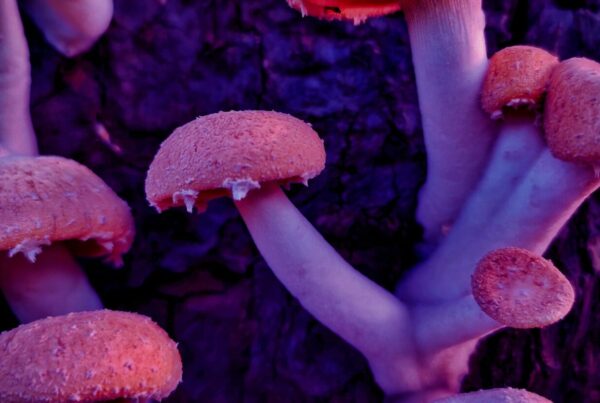The fascination with psilocybin is growing, driven by studies into its potential advantages for mental health complications such as anxiety and addiction. Despite this increasing curiosity, acquiring psilocybin remains a challenge. The number of labs and shroom delivery services offering magic mushrooms is restricted, and the prices can be relatively high.
This piece will delve into the evolution of psilocybin, its present status, and the potential benefits it presents to those seeking alleviation.
[toc]Major Takeaways:
- Mushroom farming requires substantial effort and precise monitoring to avoid contamination during the inoculation phase.
- Psilocybin triggers a psychedelic journey by interacting with various brain areas, especially the serotonin receptors.
- Psilocybin marginally increases the heart rate, which returns to normal shortly after ingestion, and usually does not lead to any other undesirable effects.

Delivering Only the Finest Quality Magic Mushrooms
Magic mushrooms naturally thrive in a variety of environments such as manure-rich fields, deciduous forests covered in leaves, grasslands, and woods. Throughout history, people have ventured into these places to collect these fungi for therapeutic use or for incorporation in spiritual and religious rites.
Conventional Approach
Currently, the traditional practice of scavenging for mushrooms in these natural habitats is less common. This shift may be attributable to the rise of newer methods such as cultivation or the possibility of buying magic mushrooms online.
Wild mushrooms are usually less potent than lab-grown types, which are carefully cultivated in controlled environments. Moreover, there’s a risk of accidentally picking a poisonous variety when scavenging in the wild.
Contemporary Technique
The procedure of shroom production commences by fostering spores to maturity. This process involves a complex method that necessitates a
The process of cultivating magic mushrooms necessitates a considerable investment of time and meticulous attention to avoid any potential contamination during the inoculation stage. When the mushrooms are ripe for harvest, they are usually dried by labs or cultivators to prolong their shelf life. Unlike fresh mushrooms that only stay fresh for a few days, dried mushrooms can be kept for several months, and in some cases, up to a year.
Manufacturers transform dried mushrooms into various forms including microdose capsules, edibles, tinctures, and beverages. These products are subsequently distributed across Canada through magic mushroom delivery services.
Harnessing the Advantages of Psilocybe Cubensis or Magic Mushrooms
The primary reason for conducting clinical research on mushrooms is to understand their impact on mental health and mood disorders, as suggested by anecdotal evidence. Numerous studies are exploring these effects, from microdosing with capsules to having a full-blown mushroom trip with dried mushrooms or chocolate edibles.
When consumed, psilocybin is metabolized into psilocin, a compound that acts similarly to serotonin, a neurotransmitter crucial for mood regulation. It interacts with various brain areas, particularly the serotonin receptors, instigating a psychedelic journey.
Those participating in psilocybin therapy often report significant changes extending beyond heightened senses and visual modifications. These experiences can result in a substantial shift in self-perception and a deep transformation in personal perspective, usually marked by profound revelations.
Depression and Suicidal Thoughts
A study published in the Journal of Psychopharmacology examined the impact of a psychedelic experience on individuals battling depression and suicidal thoughts. The majority of the participants described their psilocybin experience as highly significant and underscored its potential influence on their lives. In light of the crucial role of patient involvement in mental health treatments, such levels of satisfaction could potentially enhance treatment effectiveness.
Safety Overview
Researchers are not only studying the effects of psilocybin on depression and anxiety, but they are also examining its safety profile. A study in JAMA Psychiatry reported that participants who were administered psilocybin experienced a minor increase in heart rate and blood pressure two hours post-consumption. However, further examination via Holter monitoring revealed no significant rise in the risk of cardiac arrhythmias in the psilocybin group as compared to the niacin group. The study also discovered no considerable emotional distress among users.





